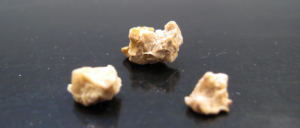 Once again, a study found an association between a worrisome health problem (intestinal polyps) with a dietary supplement (calcium), but no problems with eating the foods (calcium rich foods). The large multi-center study specifically looked at serrated polyps (SPs) because they are considered precursor lesions for colorectal cancer - that is, that while they are not cancerous, some of them will develop into cancer. Persons invited to join the study had a recent colonoscopy with at least one adenomatous polyp detected and removed, and then were scheduled for another colonoscopy 3 to 5 years later. This was considered a "chemoprevention study" to see if certain supplements help prevent polyps (and thus cancer).
Once again, a study found an association between a worrisome health problem (intestinal polyps) with a dietary supplement (calcium), but no problems with eating the foods (calcium rich foods). The large multi-center study specifically looked at serrated polyps (SPs) because they are considered precursor lesions for colorectal cancer - that is, that while they are not cancerous, some of them will develop into cancer. Persons invited to join the study had a recent colonoscopy with at least one adenomatous polyp detected and removed, and then were scheduled for another colonoscopy 3 to 5 years later. This was considered a "chemoprevention study" to see if certain supplements help prevent polyps (and thus cancer).
People in different parts of the US were randomly assigned to either receive calcium supplements (1200 mg/day of elemental calcium), vitamin D (1000 IU/day of vitamin D3), both supplements (calcium supplement plus vitamin D), or neither. Supplement treatment continued for 3 to 5 years and then there was an observational period that was 6 to 10 years after the person first started supplementation. The higher incidence of serrated polyps was a "late effect" (6 to 10 years later) and not seen during the treatment time (the first 3 to 5 years). They found that women and current smokers had higher risks of serrated polyps when exposed to supplemental calcium. Vitamin D alone was not linked with polyps.
Other studies have also found an association between calcium supplements and increased risk of certain health problems, and a lower incidence of polyps with a higher intake of dietary calcium (real food). The researchers said: "Patients with a history of premalignant serrated polyps, especially women and smokers, may wish to avoid vitamin D and calcium supplementation." BOTTOM LINE: General guidelines should be to eat foods, not supplements, to get your nutrients, vitamins, and minerals. There are many studies also at this point that a high fiber diet with lots of fruits, vegetables, whole grains, legumes (beans), nuts, seeds are associated with better intestinal health and fewer polyps (here, here). Another way to view it is: feed your beneficial gut microbes with good, real food. And especially not highly processed junk. From Medical Xpress:
Calcium supplements may boost risk of abnormal bowel growths
Calcium supplements, taken with or without vitamin D, may increase the risk of small growths in the large bowel (colon) called polyps, suggest results from a large US trial published online in the journal Gut. Polyps are small growths in the lower part of the large bowel. They are non-cancerous, but some could eventually turn into cancer if they are not removed. Polyps come in different shapes and sizes, and this study specifically focused on the risk of serrated polyps, which are less common than conventional "adenomatous" polyps, but likely have the same risk of developing into cancer.
...continue reading "Best to Eat Calcium Rich Foods, Not Calcium Supplements"

 Does vitamin D prevent cancer? There has been much debate over whether increasing levels of vitamin D (as measured in a person's blood) results in a lower incidence of cancer. Studies find a number of
Does vitamin D prevent cancer? There has been much debate over whether increasing levels of vitamin D (as measured in a person's blood) results in a lower incidence of cancer. Studies find a number of  Once again, a study finds that foods are superior to supplements (here calcium supplements). It appears that eating foods rich in calcium has protective effects against kidney stones, but taking calcium supplements may result in kidney stone growth.
Once again, a study finds that foods are superior to supplements (here calcium supplements). It appears that eating foods rich in calcium has protective effects against kidney stones, but taking calcium supplements may result in kidney stone growth.